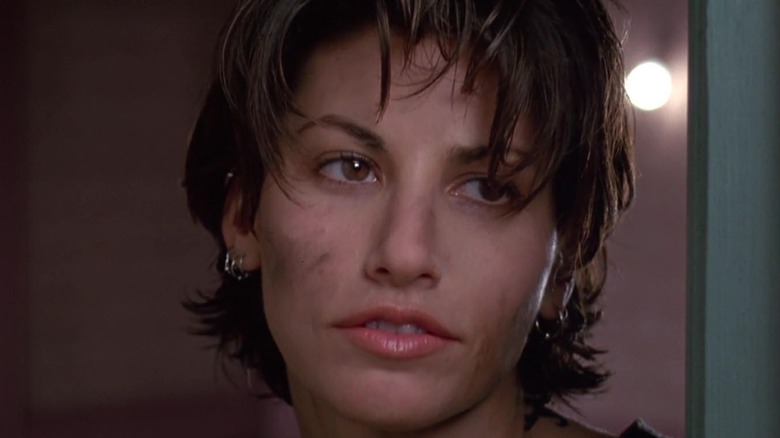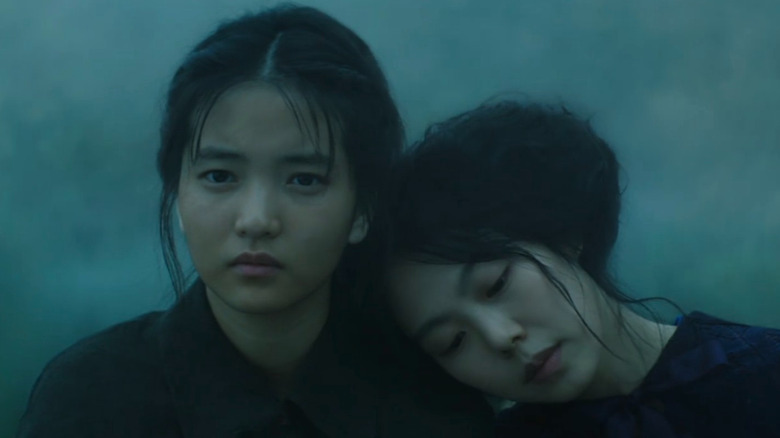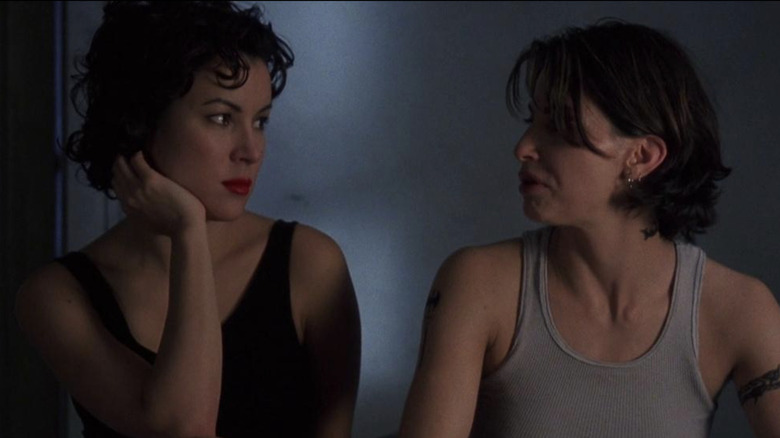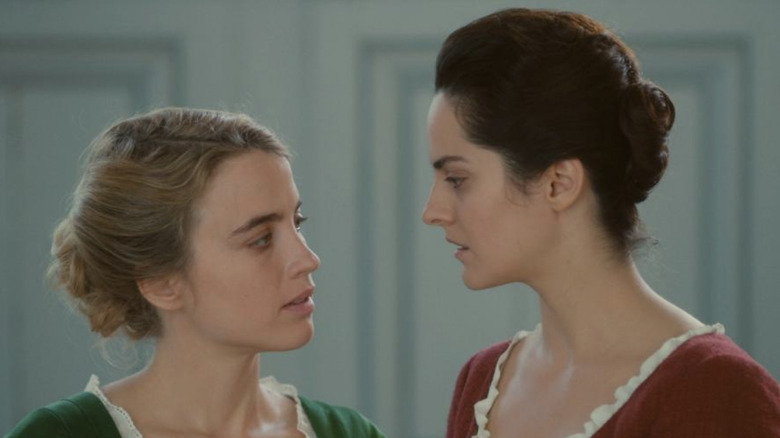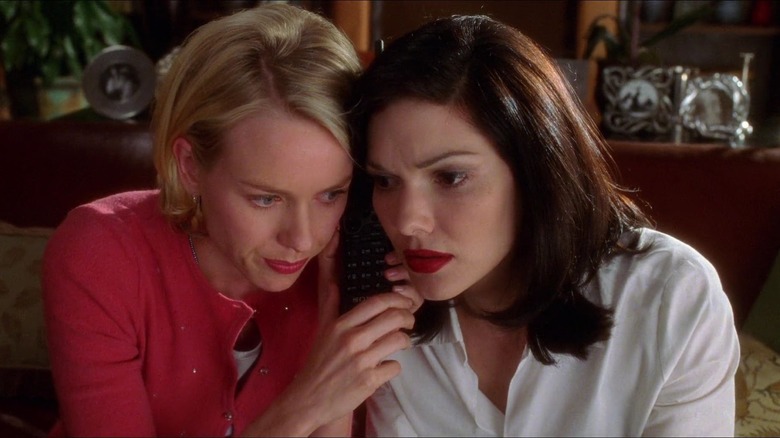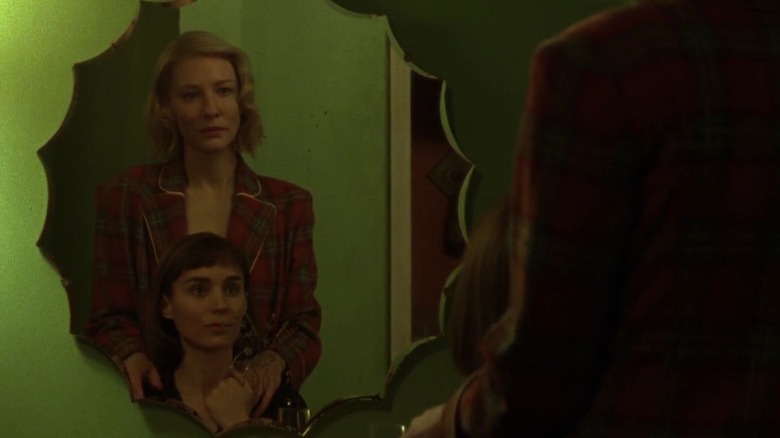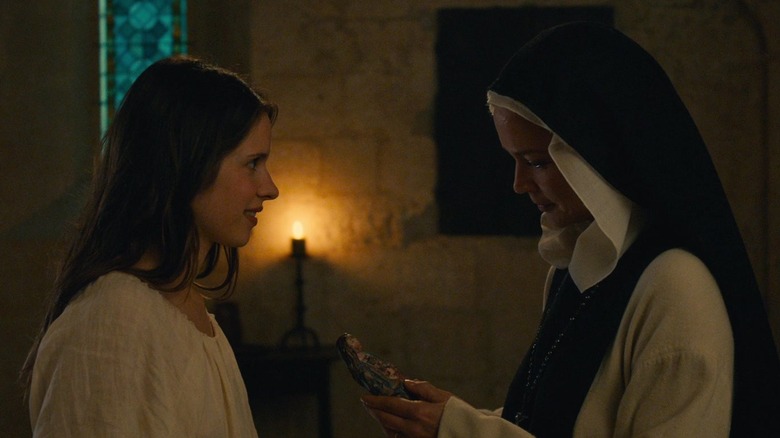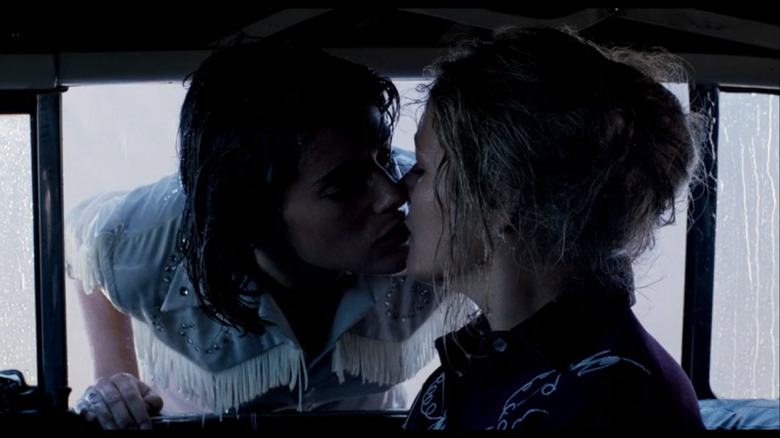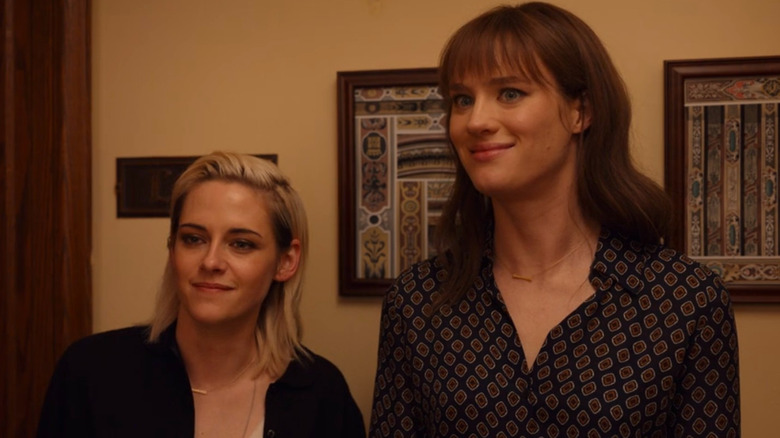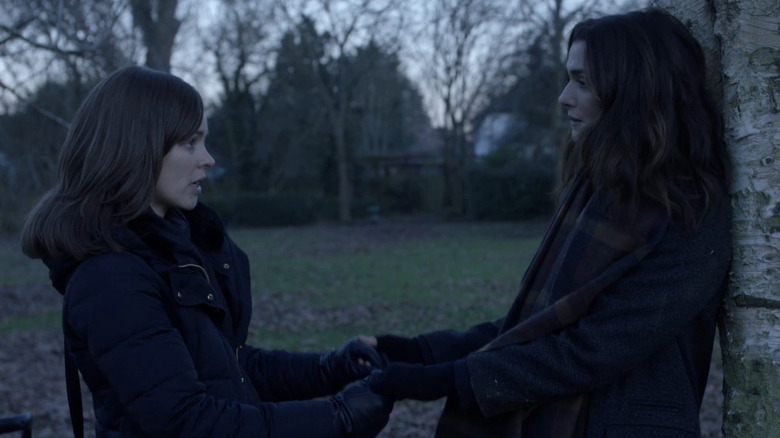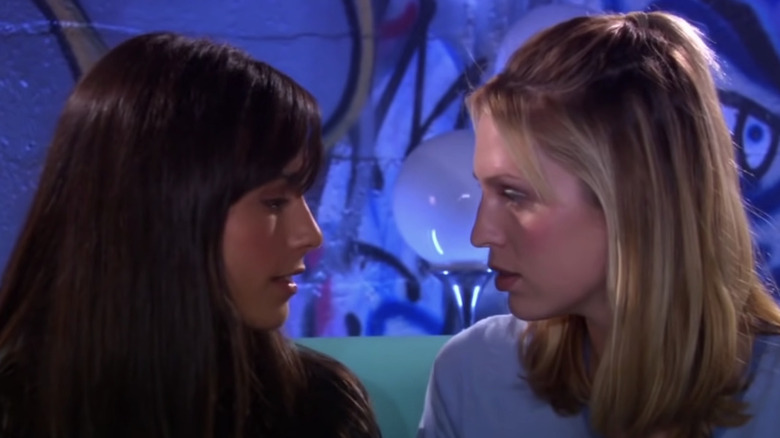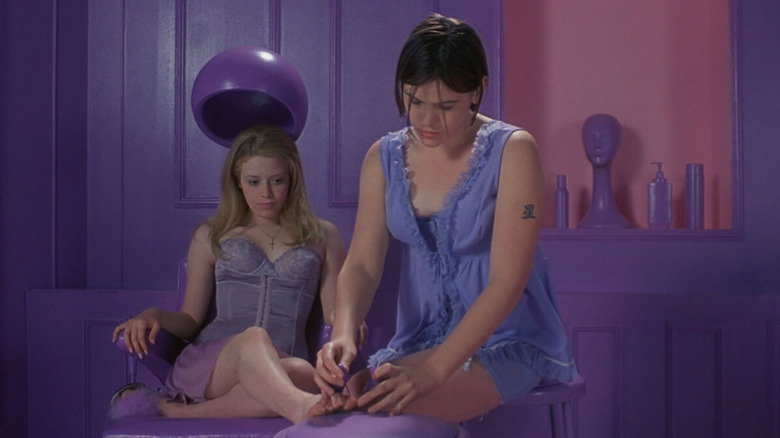The Best Lesbian Romance Movies Of All Time
Although romance movies have been a popular genre since the earliest days of film, it's only in recent decades that queer love stories have been centered and embraced in more mainstream movies the way that straight ones have. However, despite the production of some excellent classic LGBTQ+ films throughout the years, the pickings are still often rather slim for fans of lesbian romances.
At most, only a handful of lesbian romance movies are made each year, and many aren't particularly memorable. That's why we're here to help by bringing you the best of the best: the all-time greatest films about sapphic love. There are moody modern noirs, wacky subversive rom-coms, and of course, everyone's favorite strangely ubiquitous sub-genre: sad lesbian historical romances.
Before we get to the films themselves, however, a few quick disclaimers: First, we're including romances that occur between two women, even if the women involved don't identify as lesbians (some may be bisexual, for instance). We're not focusing on movies in which the love is largely subtextual (sorry "Bend It Like Beckham" and "Jennifer's Body"), or ones that only feature queerness in a sub-plot (no offense, "Atomic Blonde" and "Booksmart"). These movies are all great, but in order to make this list, a film has to primarily and explicitly be a romance between women.
We know you're eager to move past the longing looks and tentative hand touches, so let's get to the action! Here are our picks for the greatest lesbian romance movies of all time.
Warning: Spoilers below.
The Handmaiden
Park Chan-wook's "The Handmaiden" is not only one of the most masterfully crafted and re-watchable thrillers ever, it's also a killer romance. Set in Japanese-occupied Korea in the 1930s, the wealthy and beautiful Lady Hideko (Kim Min-hee) has just hired a new handmaiden, a Korean woman named Okju (Kim Tae-ri). The Lady is also being courted by the dashing Japanese noble, Count Fujiwara (Ha Jung-woo). Lady Hideko has her doubts about him, but Okju seems to like him, and she encourages her mistress to give him a chance.
As the film unfolds, however, we learn that nothing here is what it appears. Okju is actually a thief named Sook-hee, and the Count is her partner in crime. The two are attempting to trick Hideko into marrying him, so that they can then commit her to an insane asylum steal her fortune. But there's a problem. As Sook-hee gets to know Hideko, she starts falling for her, and begins to have second thoughts about this con. All this, and we haven't even gotten to any of the actual plot twists yet.
"The Handmaiden" is good in pretty much every way a movie can be good. It's a heartbreaking drama, intricately plotted crime thriller, and hilarious black comedy all in one. It would be a true masterpiece even if it didn't have lesbians in it, but what makes it even better is that it does have lesbians in it. Filled with sapphic sexual tension, unforgettable scenes, and a story that can be revisited over and over, "The Handmaiden" is a must-see for any fan of lesbian romances.
Bound
In recent years, "The Matrix" has been re-evaluated as part of the canon of queer cinema, as the film is practically bursting with transgender subtext (via Vox). In fact, Lilly Wachowski confirmed that "The Matrix" is a trans story in an interview with Netflix. But did you know that before they made "The Matrix," the Wachowskis made their debut with a film in which queerness isn't just subtext, but the actual plot?
The stylish lesbian neo-noir "Bound" tells the tale of Corky (Gina Gershon), a tough butch ex-con hired to do maintenance at an apartment building. One day, she shares an elevator ride with a mobster named Cesar (Joe Pantoliano) and his wife, Violet (Jennifer Tilly). The two women make eyes at each other, and the next day, Violet invites Corky over to — shall we say — look at her plumbing.
Violet and Corky quickly fall into a seemingly doomed relationship which, if discovered, will mean both of their deaths. But then, an opportunity falls into their laps. Violet learns that Cesar is holding onto 2 million dollars for the mob. She and Corky can steal the money and pin the theft on Cesar. If they do, both women could get a fresh start together and leave their painful pasts behind them. It's the perfect crime. What could possibly go wrong?
"Bound" is a great film that's wonderfully subversive at every turn. Usually, the only substantial role for women in film noir is the femme fatale: a beautiful and unknowable manipulator. So, it's practically revolutionary to have a movie where the femme fatale gets the chance to be the hero, as does the ... butch fatale.
Portrait of a Lady on Fire
A common topic in film criticism is the idea of the "male gaze," when women are filmed only as passive eye candy to a presumed audience of straight men — always looked at, but never looking back. But what if there were other ways to look at a woman?
"Portrait of a Lady on Fire" is a movie all about gaze and also, gays! Marianne (Noémie Merlant) is a painter, who has been hired by a Countess to create a portrait of her daughter, Héloïse (Adèle Haenel). The Countess intends to give this painting to Héloïse's future husband, but Héloïse has refused to cooperate, as she does not want to get married at all. So, the Countess has instructed Marianne to befriend Héloïse and study her features by day, then secretly paint her at night.
At first, Marianne does as she is instructed, but as the portrait nears completion, she tells her new friend the truth. To her surprise, Héloïse agrees to pose for Marianne, and the two begin work on a new portrait together, now as consenting equals. As Marianne gazes at Héloïse to complete her painting, she finds that Héloïse is gazing right back. You can guess where things go from here.
"Portrait of a Lady on Fire" is a singularly bold film, shot with a disarming clear-eyed precision that reflects the intelligence, confidence, and unsentimental pragmatism of its leads. It's groundbreaking story about gaze, consent, and so much more that is worth watching, whether you're a fan of lesbian romance films or just film in general.
Mulholland Drive
Sometimes, the films of David Lynch are cold explorations of the surreal and alien. Other times, his films are warm, lovingly crafted odes to small town people living small town lives. But perhaps no film is a better showing for both halves of Lynch than his 2001 tour de force "Mulholland Drive."
Betty (Naomi Watts) is a sweet country gal, who has just arrived in Los Angeles with dreams of stardom. She soon befriends a mysterious troubled woman with amnesia named Rita (Laura Elena Harring). As the two work together to investigate Rita's dark past, they also start to fall for each other. But if you're expecting the story to follow the standard beats of a lesbian romance, then you probably haven't seen a David Lynch film before. Instead, as Betty and Rita get closer to the truth, things start getting weird — really weird — as if reality itself is unravelling around them.
We won't spoil where the story goes from here, and even if we tried, we might not be able to. It's horrifying, it's heartbreaking, it's incomprehensible. And yet, even as the film grows increasingly surreal and abandons many of the traditional rules of film storytelling, "Mulholland Drive" always remains a beautifully twisted love story with a big bleeding vulnerable heart. What does any of that mean? You'll just have to see it for yourself.
Carol
Originally published in 1952, Patricia Highsmith's novel "The Price of Salt" is one of the most the most famous lesbian romances of all time, but it wasn't until 2015 that we finally got a proper film adaptation with Todd Haynes' "Carol." Strangely enough though, one could almost claim that it was worth the wait because it's difficult to imagine a better told version of this tale.
Set during the early 1950s, the film follows a photographer named Therese (Rooney Mara), who strikes up an unlikely friendship with an older woman named Carol (Cate Blanchett), which soon turns to love. Carol is currently in the middle of a messy divorce, and if her husband finds proof of her lesbian lifestyle, he could use it to take Carol's daughter away from her. As the larger forces of society pull these lovers apart, Therese and Carol have to decide how much they're willing to sacrifice in order to stay together.
Anchored by a pair of captivating performances by Blanchett and Mara, "Carol" is a phenomenal story of the need to be yourself in a time when that's seemingly impossible. Even though it took 63 years for this adaptation to happen, it's a good thing that this is the version of the film. After all, according to Joan Schenkar's "The Talented Miss Highsmith: The Secret Life and Serious Art of Patricia Highsmith," there was an ill-fated attempt to adapt it in the '50s by turning the titular character into "Carl."
Benedetta
Paul Verhoeven is the undisputed master of fun and schlocky exploitation films that are also wonderfully unsubtle social satires. If you thought he peaked in the '80s and '90s with films like "Robocop," "Basic Instinct," and "Starship Troopers," then you're in for a treat. In 2021, Verhoeven released a tawdry new masterpiece that can stand proudly aside the greatest films in his canon: the lesbian nunsploitation thriller "Benedetta."
Set in 17th-century Italy, Benedetta Carlini (Virginie Efira) is a devout nun with a strong connection to God. One day, a woman named Bartolomea (Daphné Patakia) pounds on the doors of the convent, seeking refuge from her abusive father. Benedetta welcomes her in, and Bartolomea soon becomes a nun herself. But this beautiful newcomer is unlike any of the other sisters in this convent. She is crude, worldly, and unafraid of going after what she wants — in this case, Benedetta. The two begin a secret romance, but that's just the start of their problems, because shortly after, Benedetta wakes up with stigmata on her hands and feet. Some think it's a hoax, but others take it as proof that she is truly divine. From here, all hell breaks loose.
"Benedetta" is everything we could ever hope for that we never knew we wanted. It's a bloody historical epic. It's a sexy lesbian romance. It's an unexpectedly nuanced exploration of religious faith. It's smart arthouse fare and a fun sleazy b-movie. Hallelujah.
Desert Hearts
The hidden gem "Desert Hearts" is from 1985, but it's so far ahead of its time that you might mistake it for a modern indie flick made just last year. Set in 1959, the film opens with Vivian Bell (Helen Shaver), a shy college professor, arriving in Reno, Nevada. She plans to stay for six weeks, so that she can establish residency and get a quick divorce from her husband. When asked why, all she says is, "I urge for something we can not analyze or rationalize." It's clear that this is a woman who does not know herself or what she wants, and she's hoping that by taking this trip, she might just find herself.
Instead, she finds Cay (Patricia Charbonneau), a brassy, uninhibited sculptor, who is openly a lesbian. Even though Vivian has never been with a woman before, she soon falls for this free-spirited futch cowgirl. Vivian finds herself at a crossroads: When this six-week vacation ends, will she forget this little fling ever happened and go back home or is Cay the home she's been searching for all along?
The film received mixed reviews upon its initial release, and it was never a hit at the box office, which is an absolute tragedy. With warm three-dimensional characters, a genuinely funny script, and plenty of gorgeous scenery, "Desert Hearts" is an outstanding film that deserves to seen be a wider audience.
Happiest Season
Most romance films begin with the two leads meeting, but at the start of "Happiest Season," Abby (Kristen Stewart) and Harper (Mackenzie Davis) have already been dating for almost a year. At first, Abby is thrilled when Harper invites her to spend Christmas with her parents until Harper drops one heck of a bombshell: Her parents don't know that she's gay or in a relationship, so until the vacation is over, they have to pretend to be platonic roommates. Don we now our straight apparel.
From here, the film becomes a delightful holiday farce in which Abby and Harper dodge awkward questions about "boyfriends" and steal time away together when they can. Things get even more complicated when Riley, one of Harper's friends from high school — who is also secretly her ex-girlfriend — enters the picture. Will Harper finally come around and tell her parents the truth, will someone else spill the big secret, or will Abby cut her losses and bail on this holiday nightmare?
Though most critics loved the film when it was released, some had reservations, feeling that the numerous trials Harper forces Abby to endure cross the line into emotional abuse. Perhaps this is because the film splits the difference between being a silly lighthearted rom-com and a genuine naturalistic drama. So, fair warning: If you're not in the right headspace, this movie might genuinely stress you out, but if you can roll with some tonal whiplash, you'll have a gay old time. In the end, perhaps the best thing about "Happiest Season" is the fact it exists at all, because don't lesbians deserve cheesy Christmas movies, too?
Disobedience
In "Disobedience," Ronit (Rachel Weisz) is a bisexual woman raised in an Orthodox Jewish community, who left home many years ago. When the film begins, she learns that her father, a beloved rabbi, has died. Ronit shows up for the funeral and reunites with two of her old childhood friends: Esti (Rachel McAdams) and Dovid (Alessandro Nivola), whom she learns have gotten married in the intervening years.
As Ronit reconnects with Esti and Dovid, there is an unspoken tension in the air. It comes to light that the reason Ronit left her community in the first place is that she and Esti were caught fooling around together as young adults. And as Ronit and Esti continue to spend together, their old passions heat up once more, until they can no longer resist engaging in a little "disobedience" once again.
There are many things to love about "Disobedience," but perhaps its most impressive feat is that it never feels too heavy. It's a story about sorrow, and yet it avoids becoming a tearful and overwrought melodrama. There are forces pulling these women apart, and yet the antagonists never become mustache-twirling villains. The melancholic coldness is always tempered by genuine human warmth, and the experience of watching it is far more uplifting than you might guess from its dour color palette.
D. E. B. S.
If you're a fan of secret agents, lesbian romance, and low-budget cult classics, then check out the 2004 film "D.E.B.S." It follows four sorority girls, who are secretly members of a Charlie's Angels-esque spy organization called D.E.B.S. Their current assignment is to capture the dangerous and enigmatic criminal mastermind Lucy Diamond (Jordana Brewster).
One fateful night, one of the D.E.B.S. named Amy (Sara Foster) crosses paths with Diamond, but the two decide not to kill each other for reasons that neither can fully articulate. As the D.E.B.S. continue to pursue Diamond, she starts aggressively flirting with Amy in all of their encounters, and against Amy's better judgment, she becomes increasingly intrigued by this sexy supervillain.
With broad humor, rapid-fire editing, and a supporting cast of wacky weirdos, "D.E.B.S." generally operates more like a live-action cartoon than a typical spy movie, and most of the time, it's a wonderful ride. The only potential strike against the film is that it is — by conventional standards — quite off-putting to look at, with laughably bad CGI, clunky use of green screen, and an almost blindingly over-lit look in most scenes. But is it bad, or is it so tacky-looking that it loops around again to being good? You decide. Our advice: Invite the girls over, make some popcorn, and have a laugh watching this sweet, silly, sapphic story.
But I'm a Cheerleader
Though it was initially a critical and commercial dud, it turns out that "But I'm a Cheerleader" was just a bit of a late bloomer, as it has since grown into a certified cult classic since its release in 1999.
The film stars every lesbian's straight crush, Natasha Lyonne, as Megan, a well-behaved and ostensibly "normal" cheerleader, who is pretty sure that she loves her boyfriend Jared. That's why she's utterly shocked when she learns that her parents are sending her to a conversion therapy camp, under suspicions that she might be gay. While she's there, she becomes friends with another teen girl, the proud and rebellious Graham (Clea DuVall). When sparks start to fly between these two girls, Megan begins to worry that her parents might be right about her.
"But I'm a Cheerleader" is just delightful in every way. In an interview with Nitrate Online, stated that the film's look was inspired by the films of John Waters, "Edward Scissorhands," and Barbie. It shows, as the film is so stylized that it often looks more like a music video than reality. The supporting cast is also practically perfect, and full of famous faces, including Melanie Lynskey, Dante Basco, and even RuPaul. Sure, there's a few moments that might seem a bit dated to modern audiences, but always in a well-meaning, Rocky Horror-esque sort of way. It's clearly a film that's by queer people, for queer people, and it totally overflows with love.
